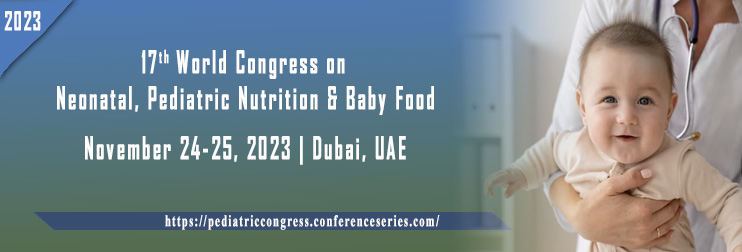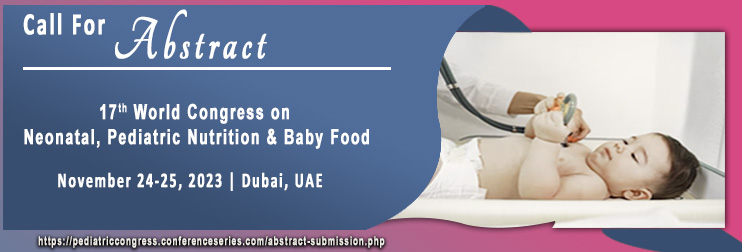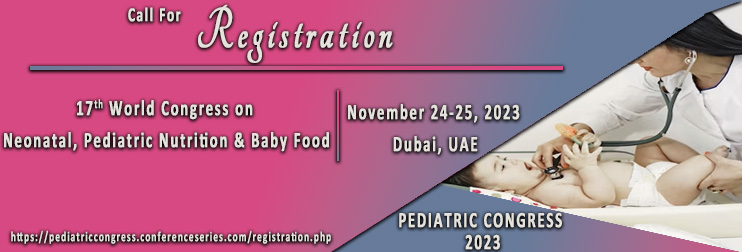Scientific Sessions/Tracks
Track 1: General Pediatrics
Pediatrics is the area of medicine that deals with the medical treatment of unborn children, children, and teenagers. A pediatrician is a specialist who deals with all elements of a child's health—physical, mental, and otherwise—during every stage of development. The goal of pediatric research is to lower the mortality rate for infants and young children, stop the spread of disease, promote a variety of healthy lifestyles for a long life free of infection, and diminish problems in children and adolescents.
Pediatric Societies and Associations:
Greek Pediatric Society, Haitian Pediatric Society, Hong Kong Pediatric Society, Icelandic Pediatric Association, Indian Academy of Pediatrics, Indonesian Pediatric Society, Iranian Society of Pediatrics, Iraqi Pediatric Society, Irish Pediatric Association, Israel Pediatric Association, Italian Society of Pediatrics, The Japan Pediatric Society, Jordan Pediatric Society, Kenya Pediatric Association
Track 2: Pediatric Nutrition and Obesity
A child's ability to develop, learn, and prosper is significantly impacted by nutrition during the first 1,000 days of life. Diet throughout pregnancy and the first few years of a child's life provides the fundamental building blocks for healthy brain development, growth, and the formation of a robust immune system. The most crucial time to ensure adequate nutrition is when a child is developing between infancy and puberty. Children who follow healthy eating habits will benefit from improved growth and development as well as immune system support and the formation of ingrained, lifelong food habits. It is crucial to always provide your child with healthy choices from all the major nutrition items, even if nutritional demands, wants, and tastes will vary greatly among children. The essential components of breast milk include fats, minerals, lactose, and proteins.
Pediatric Societies and Associations:
Union of Pediatricians of Russia, Saudi Pediatric Association, Singapore Pediatric Society, South African Pediatric Association, Spanish Pediatric Association, Sudan Association of Pediatricians, Swedish Pediatric Society, Swiss Pediatric Society, Taiwan Pediatric Association, Pediatric Society of Thailand, Pediatrics Turkish Authority, Turkish National Pediatric Society, Turkish Pediatric Association
Track 3: Neonatology
Pediatricians that specialize in neonatology provide medical attention to newborns, especially unwell or premature infants. Neonatal intensive care units typically practice this hospital-based specialty. Specialists in medicine known as neonatologists have trained specifically to handle the most difficult and dangerous illnesses. Neonatologists treat newborns who are premature or have major illnesses, injuries, absconding from the womb at birth, intrauterine growth restriction, low birth weight, sepsis, pulmonary hypoplasia, or birth asphyxia.
Pediatric Societies and Associations:
American Academy of Pediatrics, Royal Australasian College of Physician, Pediatrics & Child Health Division, Austrian Society of Pediatrics & Adolescent Medicine, Bahrain Pediatric Association, Bangladesh Pediatric Association, Belgian Society of Pediatrics, Brazilian Society of Pediatrics, Cambodian Pediatric Association, Canadian Pediatric Society
Track 4: Child Abuse and Neglect
Specialists in particular social services, wellbeing, psychological wellbeing, and the legal system have noted that child safety is a matter of most significance. More than only wounds and broken bones result from child abuse. When compared to other forms of abuse, such as emotional abuse and neglect, physical violence may be more obvious and may leave more profound, long-lasting scars. The more support previously abused children receive, the more chance they have of finding a solution and ending the cycle rather than feeding it. We can have a huge impact on a child's life by learning about general signs of abuse and what we could do to intervene.
Related Societies and Associations:
Neonatal Society, Spanish Society of Neonatology, Neonatal Society, Turkish Neonatology Society, American Pediatric Society, California Association of Neonatologists, Argentine Society of Neonatology, Chilean Society of Neonatology , National Association of Neonatal Therapists, Perinatal Society, International Association for Maternal and Neonatal Health, Colombian Federation of Perinatology, International Association for Maternal and Neonatal Health (IAMANEH), European School of Perinatal Medicine, Swiss Society of Neonatology, Israel Neonatology Association, French Society of Neonatology, National Association of Neonatal Therapists, Southeastern Association of Neonatologists (USA), Hellenic Neonatal Society, Ibero-American Society of Neonatology
Track 5: Pediatric Nursing
The therapeutic care of newborns, babies, and children from infancy through early adulthood is provided by pediatric nurses, typically in an inpatient hospital or day clinic. The main responsibility of pediatric nurses is to control the administration of medications and guide methods to newborns as specified in nursing care plans. Pediatric nurses are counted on to respond quickly in tense situations and handle stress well. Neonatal nursing is a subset of human services that focuses on supporting newborns who were born prematurely or who were afflicted with diseases, birth defects, or cardiac conditions. The Neonatal Intensive Treatment Unit (NICU) employs many neonatal nurses who provide extremely precise medical care to newborns who are at risk.
Related Societies and Associations:
Asia Pacific Pediatric Association, European Academy of Pediatrics, European Pediatric Association, Union of Arab Pediatric Societies, Union of Mid-Eastern and Mediterranean Pediatric Societies, Union of National African Pediatric Societies and Associations, Union of National Pediatric Societies of Turkish Republics, Federation of International Societies for Pediatric Gastroenterology, Hepatology, and Nutrition, International Association for Child and Adolescent Psychiatry and Allied Professors
Track 6: Pediatric Psychology
Pediatric psychology has a specialization in treating behavioral and developmental issues in newborns. The children who are seen regularly have complicated medical, developmental, and emotional/behavioral aspects that call for thorough evaluations. Many kids either have poor verbal communication skills or none. Other children present behavioral or other difficulties, such as physical ones, that have complicated earlier attempts to evaluate the child's problems related to developmental disabilities and long-term medical concerns. Child psychologists are experts in the factors that shape children's behavior. They perform both diagnosis and treatment of a wide variety of psychiatric problems.
Related Societies and Associations:
Hellenic Neonatal Society, National Association of Neonatal Therapists, French Society of Neonatology, Israel Neonatology Association, Swiss Society of Neonatology, European School of Perinatal Medicine, Chilean Society of Neonatology, Argentine Society of Neonatology, California Association of Neonatologists, Turkish Neonatology Society, Spanish Society of Neonatology, Australia and New Zealand Perinatal Society, British Association of Perinatal Medicine, Albanian Association of Perinatology
Track 7: Pediatric Infectious diseases.
Pediatric infectious diseases are conditions that will affect the child and are brought on by infectious agents including bacteria, fungi, parasites, viral diseases, etc. Bone infections, skin conditions, joint problems, and blood contaminations are a few examples of pediatric infectious disorders. Pediatric infectious disease specialists manage a wide range of infections and unusual or complex immunologic illnesses.
Related Societies and Associations:
Emirates Medical Association - Pediatric Society, Royal College of Pediatrics and Child Health, Vietnam Pediatric Association, Yemen Pediatric Association, International Society for Pediatric & Adolescent Diabetes, International Society for Social Pediatrics & Child Health, International Society of Tropical Pediatrics, Nigerian Society of Neonatal Medicine, National Neonatology Forum of India
Track 8: Pediatric Critical care and Emergency medicine.
Emergency departments frequently get head traumas in children. Which children have significant intracranial wounds that require intervention will be the subject of the provider's trial. A child can develop sepsis if their body reacts excessively to an illness. One of the most tough and severe infections in medicine is sepsis. To avoid an excessive rise in patient sickness and mortality, thorough analysis and the start of treatment are necessary.
Through both individual and group exercises, high-fidelity simulation is emerging as a useful tool for teaching in pediatric emergency medicine and critical care.
Related Societies and Associations:
International Network of Pediatric Surveillance Units, International Pediatric Academic Leaders Association, International Pediatric Nephrology Association, Vietnam Pediatric Association, Yemen Pediatric Association, International Society for Pediatric & Adolescent Diabetes, Union of National Pediatric Societies of Turkish Republics
Track 9: Pediatric Neurology
Pediatric neurology, often known as child neurology, is a specialist area of medicine that deals with the identification and management of neurological disorders in newborns, infants, kids, and teenagers. Pediatric neurology focuses on the diagnosis and treatment of all conditions that affect people in various age groups that involve the spinal cord, brain, central and peripheral nervous systems, autonomic nervous system, muscles, and blood vessels.
Pediatric Societies and Associations:
Society for Developmental and Behavioral Pediatrics, Chinese Society of Pediatrics, Croatian Pediatric Society, Czech National Pediatric Society Danish Pediatric Society, Egyptian Pediatric Society, Société Française de Pediatric, German Society of Pediatrics & Adolescent Medicine, International Child Neurology Association, International Network of Pediatric Surveillance Units, International Pediatric Academic Leaders Association, International Pediatric Nephrology Association, International Pediatric Transplant Association, International Society of Pediatric Oncology, World Federation of Associations of Pediatric Surgeons
Track 10: Pediatric Surgery
A super specialization of surgery known as pediatric surgery involves operating on fetuses, newborns, adolescents, children, and young adults. The field of pediatric surgery began to grow in the middle of the 20th century, and surgical care for newborns and young patients has improved. At children's hospitals, special kinds of novel strategies and procedures are frequently applied in pediatric surgery. Neonatal surgery and fetal surgery are subspecialties of pediatric surgery.
Pediatric Societies and Associations:
American Academy of Pediatrics, Royal Australasian College of Physician, Pediatrics & Child Health Division, Austrian Society of Pediatrics & Adolescent Medicine, Bahrain Pediatric Association, Bangladesh Pediatric Association, Belgian Society of Pediatrics, Brazilian Society of Pediatrics, Cambodian Pediatric Association, Canadian Pediatric Society
Track 11: Pediatric Oncology
The specialty of medicine needed for the detection and management of cancer in children is known as pediatric oncology. In the medical specialty of pediatric oncology, tumors in children, often up to the age of 18, are diagnosed and treated. It is one of the most challenging responsibilities since, despite the lucky treatment of many children, there is still a significant death rate associated with various forms of cancers. The stage and kind of the cancer, potential side effects, family choices, and the child's general health all play a role in how the disease is treated in children.
Pediatric Societies and Associations:
Union of Pediatricians of Russia, Saudi Pediatric Association, Singapore Pediatric Society, South African Pediatric Association, Spanish Pediatric Association, Sudan Association of Pediatricians, Swedish Pediatric Society, Swiss Pediatric Society, Taiwan Pediatric Association, Pediatric Society of Thailand, Pediatrics Turkish Authority, Turkish National Pediatric Society, Turkish Pediatric Association
Track 12: Pediatric Vaccines and Immunization
Immunizations are vital for global health and are fundamental elements of modern medicine. Depending on your location, your child's health, the type of vaccine, and the vaccines' availability, the recommended immunization schedule may differ. The recommended immunization schedule aims to protect infants and young children during the most vulnerable period of their lives—before they are exposed to potentially fatal infections. Vaccines include viruses that have been weakened or variants that resemble viruses (called antigens). This means that while the antigens cannot cause the disease's symptoms or signs, they might stimulate the immune system to manufacture antibodies. If you are exposed to the virus again in the future, these antibodies will help to protect you.
Pediatric Societies and Associations:
Greek Pediatric Society, Haitian Pediatric Society, Hong Kong Pediatric Society, Icelandic Pediatric Association, Indian Academy of Pediatrics, Indonesian Pediatric Society, Iranian Society of Pediatrics, Iraqi Pediatric Society, Irish Pediatric Association, Israel Pediatric Association, Italian Society of Pediatrics, The Japan Pediatric Society, Jordan Pediatric Society, Kenya Pediatric Association
Track 13: Pediatric Gastroenterology and Hepatology
The medical specialties of pediatric gastroenterology and hepatology combine the research of the pancreas, liver, gallbladder, and biliary tree with the investigation of the gastrointestinal system. Acute diarrhea, frequent vomiting, gastritis, and issues with the growth of the stomach tract are among its typical disorders. Seeking expert assistance is mostly motivated by illnesses and difficulties linked to alcohol use and viral hepatitis.
Pediatric Societies and Associations:
Asia Pacific Pediatric Association, European Academy of Pediatrics, European Pediatric Association, Union of Arab Pediatric Societies, Union of Mid-Eastern and Mediterranean Pediatric Societies, Union of National African Pediatric Societies and Associations, Union of National Pediatric Societies of Turkish Republics, Federation of International Societies for Pediatric Gastroenterology, Hepatology, and Nutrition, International Association for Child and Adolescent Psychiatry and Allied Professors
Track 14: Pediatric Endocrinology
A medical specialist known as pediatric endocrinology treats conditions affecting the endocrine system, including diabetes, abnormalities in adolescent sexual and physical development, and more. Pediatric endocrinologists care for patients from their youngest stages through late adolescence and young adulthood, treating them according to their age factor. Pediatric endocrinologists are medical professionals who treat children who have problems with growth, adolescence, diabetes, or other problems involving the hormones and the organs that produce them.
Pediatric Societies and Associations:
Society for Developmental and Behavioral Pediatrics, Chinese Society of Pediatrics, Croatian Pediatric Society, Czech National Pediatric Society Danish Pediatric Society, Egyptian Pediatric Society, Société Française de Pediatric, German Society of Pediatrics & Adolescent Medicine, International Child Neurology Association, International Network of Pediatric Surveillance Units, International Pediatric Academic Leaders Association, International Pediatric Nephrology Association, International Pediatric Transplant Association, International Society of Pediatric Oncology, World Federation of Associations of Pediatric Surgeons
Track 15: Pediatric and Adolescent Diabetes
Type 1 diabetes, which typically affects children, is brought on by the pancreas' inability to produce insulin. Additionally, the pancreatic beta cells were destroyed by the autoimmune system. One in 400 children, adolescents, and young adults under the age of 20 have type 1 diabetes. When a youngster exhibits the typical signs and symptoms of diabetes, together with unusually high blood glucose levels and ketones in the urine, the diagnosis is made. Diabetes type 1 is a chronic condition that has no known cure. The most effective treatment for type 1 diabetes, however, is the prescription of insulin.
Pediatric Societies and Associations:
The Korean Pediatric Society, Kuwait Pediatric Society, Lebanese Pediatric Society, Malaysian Pediatric Association, Confederation Nacional de Pediatric de Mexico, Nepal Pediatric Society, Pediatric Association of the Netherlands, Pediatric Society of New Zealand, Pakistan Pediatric Association, Philippine Pediatric Society, Polish Pediatric Society, Portuguese Society of Pediatrics, Romanian Society of Social Pediatrics
Track 16: Pediatrics Otolaryngology
Otolaryngology, also known as ENT, is a therapeutic and surgical specialty concerned with the diagnosis, management, and treatment of disorders, illnesses, and diseases of the ear, nose, and throat (ENT) and related head and neck structures, including the sinuses, larynx (voice box), oral cavity, and upper pharynx (mouth and throat) in children.
A pediatric otolaryngologist is qualified to treat conditions that affect the ear, nose, or throat in children and may require surgery or sophisticated medication.
Pediatric Societies and Associations:
Emirates Medical Association - Pediatric Society, Royal College of Pediatrics and Child Health, Vietnam Pediatric Association, Yemen Pediatric Association, International Society for Pediatric & Adolescent Diabetes, International Society for Social Pediatrics & Child Health, International Society of Tropical Pediatrics, Nigerian Society of Neonatal Medicine, National Neonatology Forum of India
Track 17: Pediatric Allergy
Children experience allergies more frequently than adults do. This is because children's immune systems need to be protected against different allergens because they haven't fully matured. The only things that can make a person allergic to something are allergens. The allergy specialist treats kids who are having allergic reactions. The diseases or symptoms brought on by allergic substances will be evaluated and treated by an allergist.
Pediatric Societies and Associations:
Union of Pediatricians of Russia, Saudi Pediatric Association, Singapore Pediatric Society, South African Pediatric Association, Spanish Pediatric Association, Sudan Association of Pediatricians, Swedish Pediatric Society, Swiss Pediatric Society, Taiwan Pediatric Association, Pediatric Society of Thailand, Pediatrics Turkish Authority, Turkish National Pediatric Society, Turkish Pediatric Association
Track 18: Pediatric Cardiology
Pediatric cardiology is a field of medicine that treats problems with the heart and other circulatory system components. The unborn child's heart is the main organ to develop and is crucial to the health of the child for the rest of their lives. Pediatricians that specialize significantly in cardiology are known as pediatric cardiologists. Congenital heart defects, coronary artery disease, heart failure, valvular heart disease, and electrophysiology are all medical conditions that are discovered and treated in this discipline.
Pediatric Societies and Associations:
American Academy of Pediatrics, Royal Australasian College of Physician, Pediatrics & Child Health Division, Austrian Society of Pediatrics & Adolescent Medicine, Bahrain Pediatric Association, Bangladesh Pediatric Association, Belgian Society of Pediatrics, Brazilian Society of Pediatrics, Cambodian Pediatric Association, Canadian Pediatric Society
Track 19: Pediatric Nephrology
Children with various acute and chronic kidney-related issues are extensively diagnosed and managed by the Division of Pediatric Nephrology. The division assesses and manages kidney failure, glomerulonephritis, proteinuria, hematuria, renal tubular acidosis, and hypertension. Like adult patients, juvenile patients with end-stage kidney infection receive comprehensive care, including attention to patients requiring hemodialysis, peritoneal dialysis, and post-kidney transplant follow-up care.
Pediatric Societies and Associations:
The Korean Pediatric Society, Kuwait Pediatric Society, Lebanese Pediatric Society, Malaysian Pediatric Association, Confederation Nacional de Pediatric de Mexico, Nepal Pediatric Society, Pediatric Association of the Netherlands, Pediatric Society of New Zealand, Pakistan Pediatric Association, Philippine Pediatric Society, Polish Pediatric Society, Portuguese Society of Pediatrics, Romanian Society of Social Pediatrics



